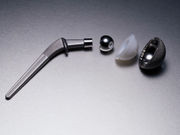WOMAC OA Index scores for pain or function did not differ for patients with psoriasis, osteoarthritis
WEDNESDAY, Feb. 17, 2016 (HealthDay News) — For patients undergoing total hip arthroplasty (THA), neither psoriatic arthritis (PsA) nor cutaneous psoriasis (PsC) are risk factors for poor outcomes, according to a study published in the February issue of Arthritis & Rheumatology.
Lisa A. Mandl, M.D., M.P.H., from the Hospital for Special Surgery in New York City, and colleagues compared THA outcomes for patients with PsA or PsC with those of patients with osteoarthritis (OA). Data were included for 63 and 153 patients with validated PsA and PsC, respectively.
The researchers found that PsA and PsC patients had higher body mass index and more comorbidities than OA controls. Fifty-four and 8 percent of PsA and PsC patients were treated with biologics or nonbiologic disease-modifying antirheumatic drugs. The groups did not differ in pre- or postoperative Western Ontario and McMaster Universities OA Index scores for pain or function. OA controls had better summary scores on the Short-Form 36 mental component pre- and postoperatively (P = 0.006 and P < 0.001, respectively, versus PsA or PsC). Postoperative EuroQoL 5-domain health-related quality of life scores were significantly worse with PsA or PsC (P < 0.0001). PsA and PsC were not risk factors for worse THA outcomes. All three groups had high satisfaction with outcome (P = 0.54).
“This is important information to convey to patients with either PsA or PsC who are contemplating surgical intervention with THA,” the authors write.
One author disclosed ties to UpToDate. Two authors disclosed financial ties to Zimmer Biomet.
Copyright © 2016 HealthDay. All rights reserved.








